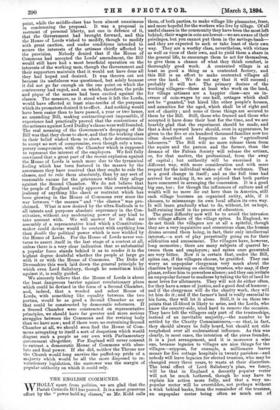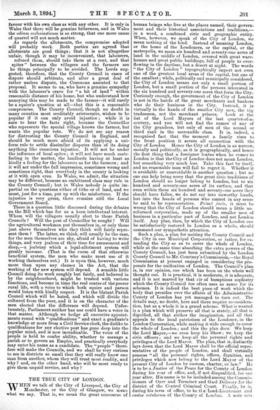THE ENGLISH COMMUNES.
WHOLLY apart from politics, we are glad that the Y Parish Councils Bill has passed. It is a most generous effort by the "power holding classes," as Mr. Kidd calls them, of both parties, to make village life pleasanter, freer, and more hopeful for the workers who live by tillage. Of all useful classes in the community they have been the most left behind; their wages in coin arelowest—we are aware of their privileges, but you cannot put them in the savings-bank- and they are expected to seek or take least of their own way. They are a worthy class, nevertheless, with virtues as well as vices of their own, and to yield them a share in the general life, to encourage them to act for themselves, to give them a chance of what they think comfort, is thoroughly good work. A contented village is at least as good a thing as a contented factory, and this Bill is an effort to make contented villages all over the land. We do not say that it will succeed ; probably it will not. The primary desires of the working villagers—those at least who work on the land, for village artisans are a happier class—are an in- crease of coin-wages by one half, cottages which shall not be "granted," but hired like other people's houses, and annuities for the aged, which shall be of right and not of charity ; and none of these things are secured to them by the Bill. Still, those who framed and those who accepted it have done their best for the time, and we are heartily glad that the experiment should be made, and that a dead upward heave should, even in appearance, be given to the five or six hundred thousand families now too often described and forgotten as the "agricultural labourers." The Bill will no more release them from the squire and the parson and the farmer, than the dreams of the Fabian Society will release the artisan, or, for that matter, the professional, from the sway of capital ; but authority will be exercised in a different way, with more consideration and with more respect for the individual wishes of the workman. That is a good change in itself; and as the full time had arrived for making it, we are rejoiced that both parties have concurred in arranging the concession. It is a good big one, too ; for though the influences of culture and of wealth will no more die out here than in America, still each village becomes an organised entity, able, if it chooses, to mismanage its own local affairs its own way. It will learn gradually what to do, without, let us hope, half-ruining itself in the process of education. The great difficulty now will be to avoid the intrusion into village affairs of the village spites. In England, we do not think the villagers are at all a spiteful, though they are a very inquisitive and censorious class, the human drama around them being, in fact, their only intellectual interest,—a sort of play perpetually going on for their edification and amusement. The villagers have, however, long memories ; there are many subjects of quarrel be- tween them and employers ; and spites once generated are very bitter. Now it is certain that, under the Bill, spites can, if the villagers choose, be gratified. They can worry an unpopular clergyman very much about the charities by insisting on electing trustees, who may, if they please, reduce him to powerless silence; and they can irritate an unpopular farmer to madness by taking the bit of land he most loves for allotments. They will not do either often, for they have a sense of justice, and a good deal of humour ; and if the clergyman will do the charity work, they will let him do it; and if the farmer's land is really essential to his farm, they will let it alone. Still, it is on these two points that ill-blood is likely to arise, and the Lords, who know the country-side, tried hard. to remove the occasion. They have left the villagers only part of the trusteeships, instead of an inevitable majority,—the number to be settled by the Charity Commissioners,—so that, in fact, they should always be fully heard, but should not ride roughshod over all ecclesiastical influence. As this was clearly, in most cases, the intention of the pious founder, it is a just arrangement, and it is moreover a wise one, because legacies to villages are nice things for the villages—suppose, for example, a millionaire leaves money for five cottage hospitals in twenty parishes—and nobody will leave legacies for elected trustees, who may be changed every three years, to waste at their discretion. The total effect of Lord Salisbury's plan, we fancy, will be that in England a decently popular rector will not be much bothered, though he may have to explain his action more fully, and that a very un- popular rector will be overridden, not perhaps without a wink behind backs, from the remainder of the trustees, an unpopular rector being often as much out of favour with his own class as with any other. It is only in Wales that there will be genuine bitterness, and in Wales the odium ecclesiasticum is so strong, that one more cause of quarrel will not much matter. As regards the allotments, the compromise adopted will probably work. Both parties are agreed that allotments are good things; that it is not altogether unfair, though it may be inconvenient, that labourers, refused them, should take them at a rent, and that spites" between the villagers and the farmers are he things principally to be avoided. The Lords sug- gested, therefore, that the County Council in cases of dispute should arbitrate, and after a great deal of rather useless dispute, the Commons assented to that proposal. It seems to us, who have a genuine sympathy with the labourer's crave for "a bit of land" within reasonable distance of his home, but who understand how annoying this may be made to the farmer—it will rarely be a squire's question at all—that this is a reasonable compromise. The County Council, though no doubt in many counties most creditably aristocratic, wishes to be popular if it can only avoid injustice ; while it is sure to hear the facts right, because the Councillor who represents the special village knows the farmer, but wants the popular vote. We do not see any reason for distrusting the County Council in England, and should be much more afraid of its applying a uni- form rule to settle dissimilar disputes than of its doing anything like conscious injustice. It will not be under the influence of local spites ; it will not have much caste- feeling in the matter, the landlords having at least as kindly a feeling for the labourers as for the farmers ; and it will act under the full impression, sometimes wrong and sometimes right, that everybody in the county is looking at it with open eyes. In Wales, we admit, the situation may be different, because an embittered class may rule in the County Council ; but in Wales nobody is quite im- partial on the questions either of tithe or of land, and we must, just for a time, put up with the misfortune. If the injustice is very gross, there remains still the Local Government Board.
There is a question little discussed during the debates on the Bill which has for us a keen intellectual interest. Whom will the villagers usually elect to these Parish Councils ? Will the post of Councillor be sought ? Will the agricultural workmen put themselves in, or only those just above themselves who they think will fairly repre- sent them ? The latter, we think, will usually be the case, for the men themselves are shy, afraid of having to write things, and very jealous of their time for amusement and sleep,—a jealousy which a legal-allotment system will greatly increase. (That is the curse of that otherwise beneficial system, the men who make most use of it working themselves out.) It is upon this, however, much more than upon any clauses in the Act, that the working of the new system will depend. A sensible little Council doing its work roughly but fairly, and believed in by the neighbourhood, might be trusted with various functions, and become in time the real centre of the; poorer rural life, with a voice to which both squire and parson would listen with kindly respect. It is the blatant Parish Council which will be hated, and which will divide the cultured from the poor, and it is on the character of the men elected that the difference will depend. Unfor- tunately, Parliament neither has nor could have a voice in that matter. Although we hedge all executive appoint- ments round with " qualifications " and exact a graduate's knowledge or more from a Civil Service clerk, the dislike to qualifications for any elective post has gone deep into the popular mind, and is now ineradicable. The voice of the people is held to confer ability, whether to manage a parish or to .govern an Empire, and practically everybody may enter his name as a candidate. The "people" there- fore will make the Councils, and we shall be very curious to see in districts so small that they will really know one man from another, whom they will trust most readily, and why ? and, on the other hand, who will be most ready to give them unpaid service, and why ?







































 Previous page
Previous page